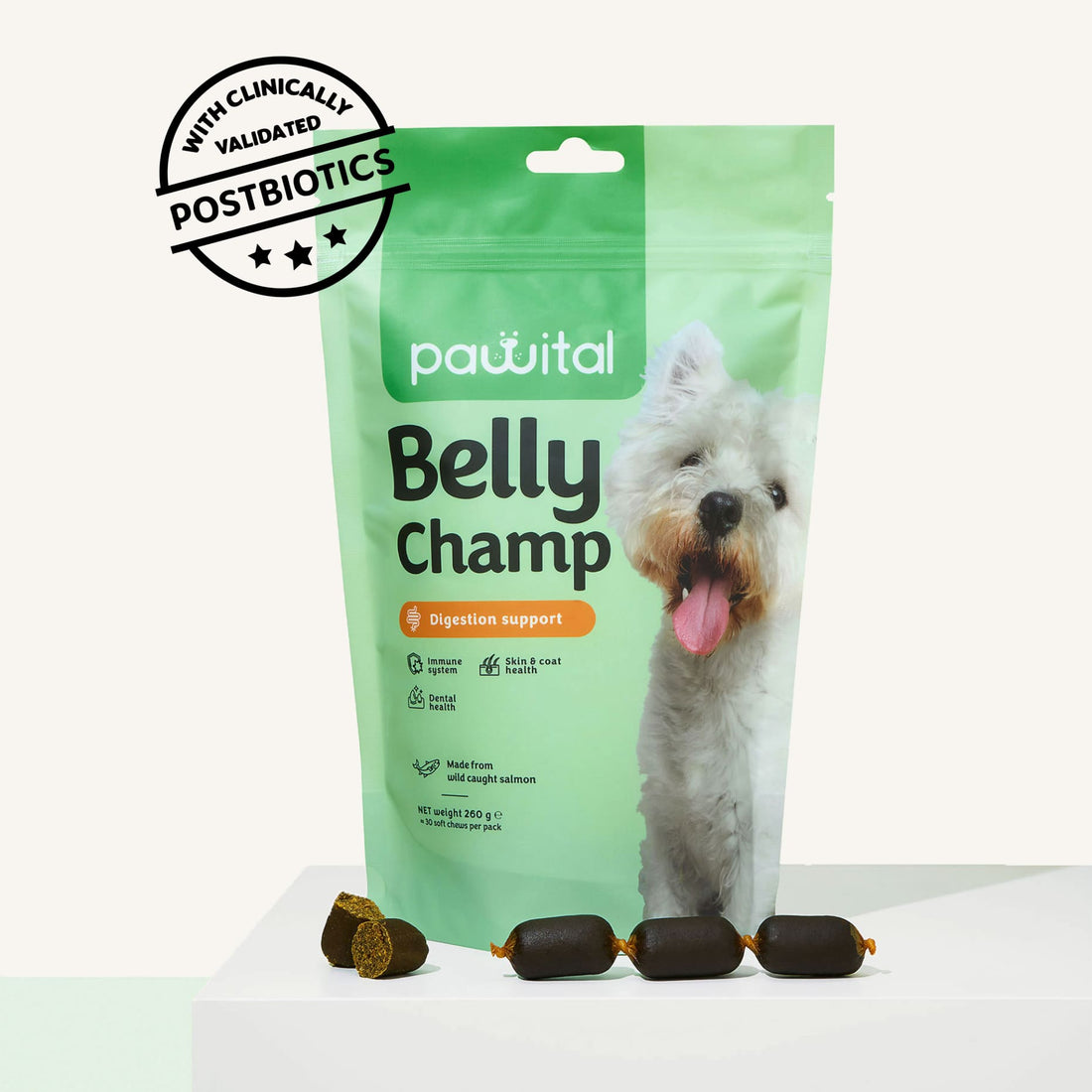How Pre-, Pro- and Postbiotics Actually Work Inside Your Dog’s Body

Seeing your dog constantly scratch, chew their paws or struggle with digestive problems is always stressful. But for the dog it’s more than just uncomfortable—it’s a sign of deeper imbalance.
Often, these symptoms reveal poor gut health and a weakened immune system.
A disturbed gut leads to inflammation throughout the body, causing your dog’s immune system to overreact to harmless things, like food or environmental allergens. It can lead to yeast infections, malnutrition, anxiety, higher vulnerability to illness and even reduced lifespan.
Continue reading to understand exactly how probiotics, prebiotics and postbiotics work inside your dog’s body to help you support their health for the long-term.
How Exactly Does Gut Health Affect the Immune System?
Your dog’s gut and immune system are deeply connected.
In fact, around 70% of a dog’s immune cells live within or around the digestive tract. The gut lining acts as a gatekeeper, deciding which nutrients to absorb and which toxins or harmful bacteria to block out.
When gut health suffers, the lining becomes damaged, allowing harmful substances (like allergens or toxins) to leak into the bloodstream.
The immune system senses these threats and reacts aggressively, resulting in inflammation throughout the body—including the skin. This explains why poor gut health often triggers chronic itching, redness, and paw licking.
STEP-BY-STEP: How Prebiotics, Probiotics, and Postbiotics Heal Your Dog’s Gut and Immune System
Restoring your dog’s gut and immune health is a gradual process that involves three essential steps:
Step 1: PREBIOTICS – Feeding the Friendly Bacteria

Prebiotics are special fibres (like inulin or FOS) that beneficial gut bacteria eat and use as fuel. They reach your dog’s colon intact, where friendly bacteria ferment them into nourishing substances.
How they work:
- Good bacteria consume prebiotics, which helps them multiply quickly.
- As beneficial microbes grow, they outnumber harmful bacteria, reducing inflammation and strengthening the gut lining.
Step 2: PROBIOTICS – Reinforcing the Good Bacteria

Probiotics are live, beneficial bacteria (such as Lactobacillus or Bifidobacterium) added directly into your dog’s gut environment.
How they work:
Think of probiotics as tiny factories in your dog's gut. These factories take the prebiotic fuel you provided and convert it into valuable substances (metabolites) that promote health, such as amino acids, vitamins, short chain fatty acids and more.
- Probiotics introduce fresh, beneficial bacteria to help restore the natural microbial balance.
- They compete directly against harmful bacteria for nutrients and space, helping to control overgrowth and inflammation.
- They actively strengthen the gut barrier, reducing harmful substances from leaking into the bloodstream.
Step 3: POSTBIOTICS – The Healing and Immune-Modulating Compounds

Postbiotics are beneficial metabolites (like amino acids, vitamins, and short-chain fatty acids) delivered directly into your dog's gut through a supplement, rather than being produced by probiotics inside the gut.
Beneficial metabolites are naturally produced by probiotics ("the factories") in your dog's gut; however, adding extra metabolites directly through postbiotics ensures your dog immediately gets enough of these health-promoting substances, accelerating gut repair and immune-system balancing.
How they work:
- Postbiotics directly reduce inflammation by nourishing and repairing the gut lining.
- They help seal gaps in the intestinal wall, preventing toxins and allergens from triggering immune reactions.
- They provide your dog with valuable nutrients that they need to
- Crucially, postbiotics also modulate the immune system, meaning they teach immune cells not to overreact unnecessarily—this is key for resolving itching, allergies, and chronic inflammation.
What are Metabolites?
Metabolites are beneficial substances naturally produced when probiotics ("good" bacteria) break down prebiotic fibres. They're like the gut's natural medicines—helping keep the gut lining strong, calming inflammation, and balancing the immune system.
Examples of metabolites and their functions:
- Short-chain fatty acids (like butyrate): Strengthen gut lining and reduce inflammation.
- Amino acids: Help rebuild tissues and support immune cell function.
- Vitamins (like B vitamins): Improve nutrient absorption and boost energy levels.
- Enzymes: Enhance digestion, helping your dog absorb nutrients effectively.
- Organic acids (like lactic acid): Help control harmful bacteria and yeast growth, balancing the gut microbiome.
- Antimicrobial peptides: Act like natural antibiotics to protect against infections.
- Polyphenols and antioxidants: Reduce oxidative stress and inflammation throughout the body.
- Neurotransmitter precursors (like tryptophan): Support mood regulation and calm anxiety.
In addition to the gut and immune system, metabolites help:
- Maintain healthy skin and coat.
- Support liver detoxification and overall metabolic health.
- Promote brain function, reducing stress and supporting emotional well-being.
- Balance hormones and metabolism for a healthier weight.
Why Results Don’t Happen Overnight
Restoring gut and immune health takes weeks because beneficial microbes and postbiotics must gradually rebalance the entire digestive environment. Your dog’s gut lining also needs time to heal and regenerate fully. Typically, noticeable and lasting results appear within about two months.
When you support your dog’s gut with prebiotics, probiotics, and postbiotics, you’re not just solving immediate issues—you’re building a foundation for long-term health, comfort, and happiness.
Long-term results include better nutrient absorption, increased energy and happiness (most of serotonin - the happiness hormone - actually resides in the gut), reduced risk of metabolic diseases, reduced risk of infections, and generally better wellbeing.
-
Belly Biotics
 Belly Biotics
Belly Biotics- Regular price
-
€19,90 €79,90 - Regular price
-
€19,90 - Sale price
-
€19,90 €79,90




